Civilization: Beyond Earth has a win condition where you and your robotic army invade Earth
This world is yours for the taking
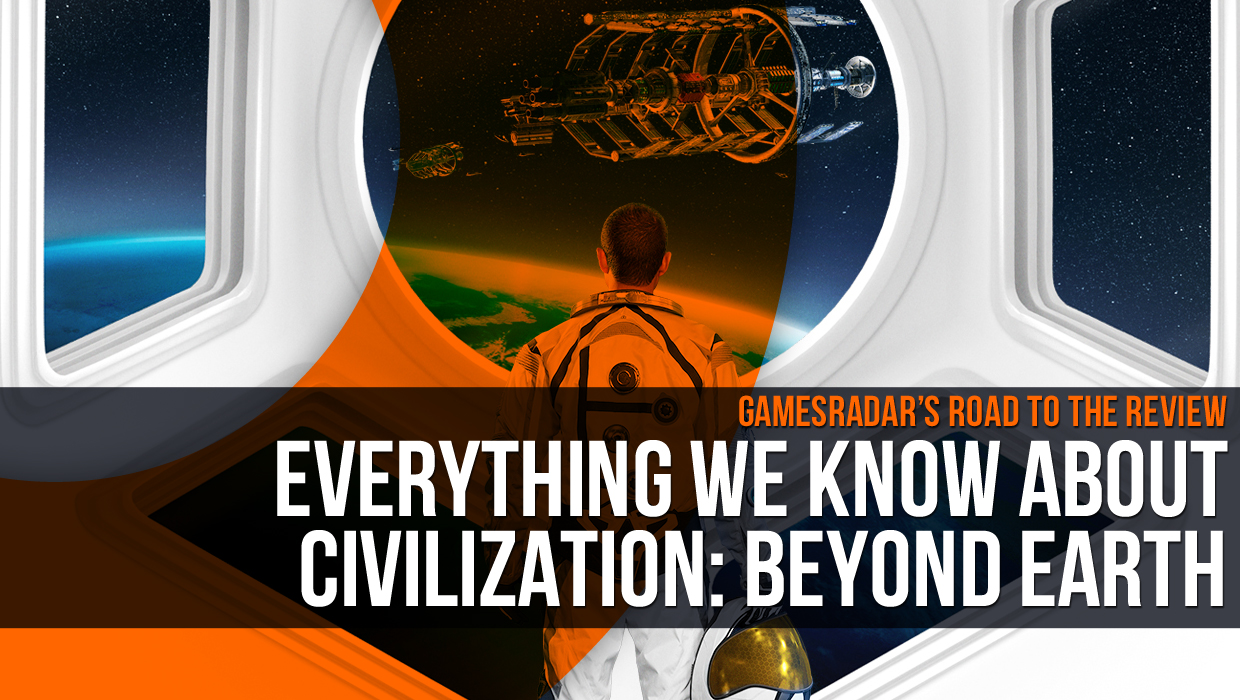
The Civilization series has always been about giving you the tools to rewrite history, waging war as Gandhi or researching nuclear technology for the Mayans. But Civilization: Beyond Earth gives you the power to guide humankind into the far future, in a time when Earth lies in shambles and the population needs a new planet to inhabit. That's where you and your decision-making skills come in.
Set for release on PC, Mac, and Linux this fall, Civilization: Beyond Earth lets you shape an alien environment to suit your needs, though you're not the only human outpost on this untamed planet. It's the Civilization gameplay you know and love, in a fantastical sci-fi universe that puts the fate of our entire species in your hands. Here's everything you need to know about Civ in outer space...
It takes place on an alien planet after earth becomes uninhabitable

A few hundred years after the stage at which a normal game of Civilization ends, humanity eventually screws up the world. Shocker. Because of society's follies, a number of different groups launch colonization ships towards an alien planet. Beyond Earth takes place on said unnamed planet--which is different every time--presenting players with a new, virgin biosphere to explore.
And what you'll find on the surface can be wildly different from what's on Earth. Firaxis overhauled its map generation system to allow for different climates and environments, from massive desert planets (think Dune or Tatooine) to worlds totally covered in fungus. You'll also encounter strange life forms and weird, alien geography that you'd never see in a typical game of Civ.
Choices you make before leaving Earth impact your Civ
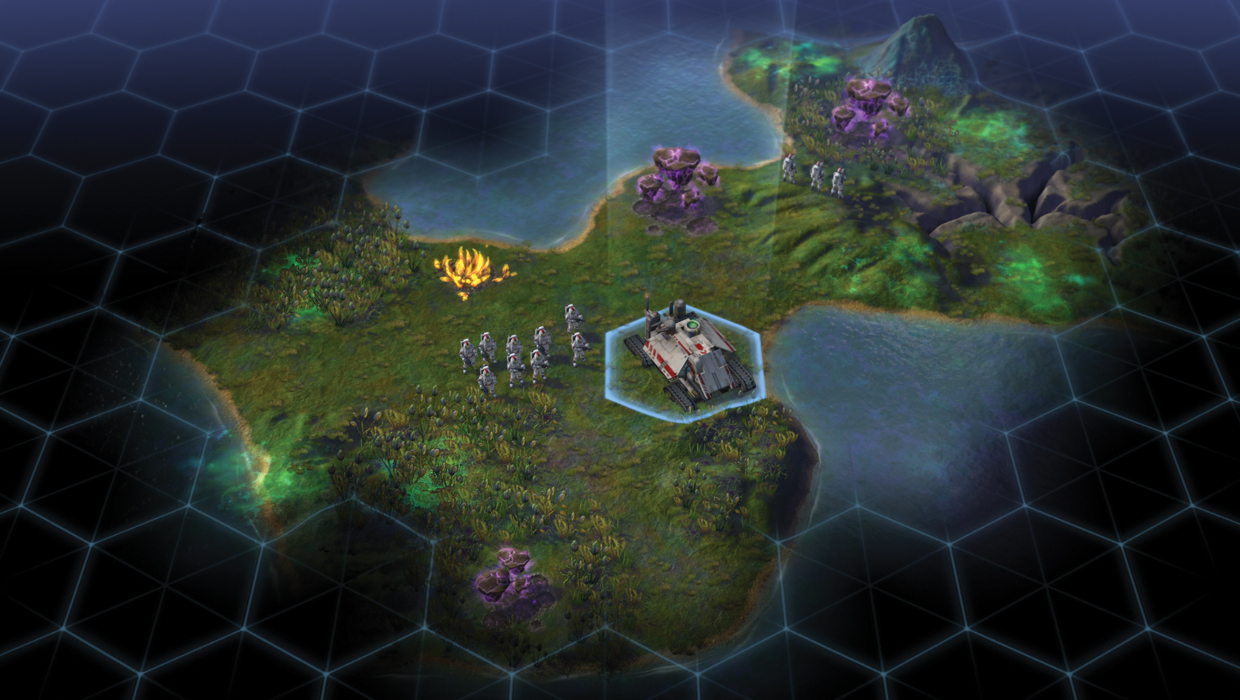
While you won't be actively playing the game while your Civilization packs up and leaves Earth, you'll still be able to make the decisions that shape your society. Before leaving Earth you're able to decide what sort of stuff to take with you. Grabbing more colonists might give you some bonus scientists, whereas extra spacecraft could have you starting with additional resources.
These choices, in a way, are tantamount to a Civilization creator. Since the Civs aren't based on history, it's more open to customization. Each of the eight Civs (US Megacorporation, Slavic Federation, African Union, Pan-Asia, etc.) comes with one bonus, but the rest are gained in these pre-launch decisions.
Gameplay-wise, it's a traditional Civ affair mostly
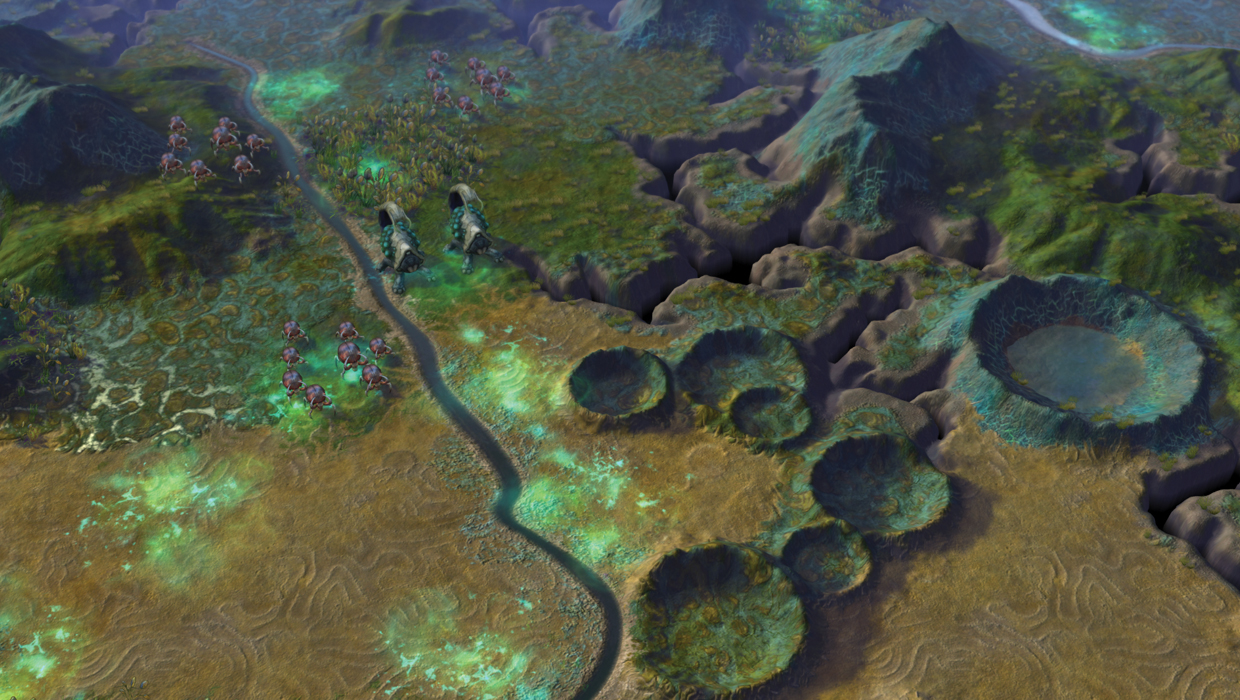
Don't let these massive departures from past Civilization games fool you. Deep down, Beyond Earth looks like a game that fits right in line with the franchise's legacy. It's built "on the bones of the Civ idea," according to the developers, so you're still building cities on a hex grid and exploring a world. Tech trees, unit improvements, one unit per tile... you know the deal. But that's not to say it's the same game with a different coat of paint.
Weekly digests, tales from the communities you love, and more
The design team reviewed every mechanic of Civ to see what does and doesn't work. Things like Great People, which were instrumental to the Civilization formula before, simply don't make sense when there's no history to go off of, so they were cut. Other things, like trade routes and the tech tree layouts, were maintained but modified deeply.
The tech tree is more of a tech web
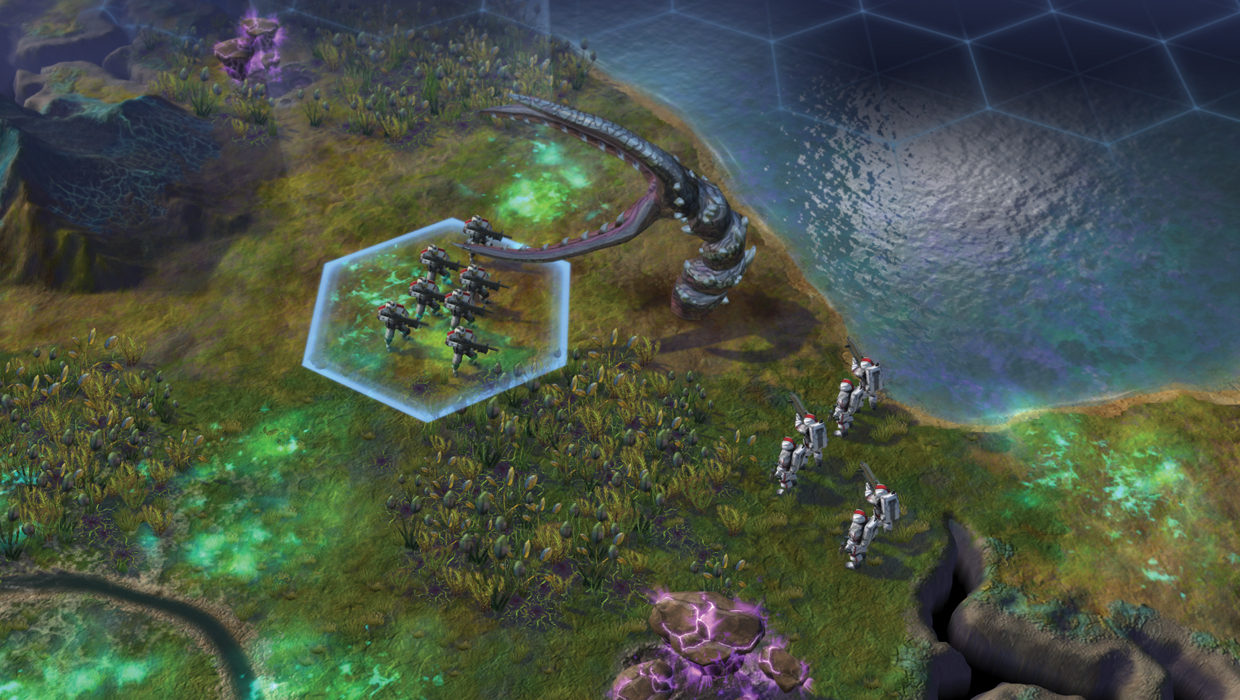
You don't need to convince people to get cannons in Civilization 5. They're cannons, for crying out loud; you know what they do, and you want them. Civ's linear tech tree makes sense when you're building off the back of historical technology--but it doesn't necessarily fit when you're researching technology that hasn't been invented yet. Because of that, Beyond Earth's tech tree is a web, and everyone starts in the center.
The web is organized around three themes, each moving towards a different victory condition. The first choices are fairly typical sci-fi tropes, but the further down the web you move, the crazier things get. Near the edge of the "Alien Sciences" thread, you'll be able to genetically engineer Designer Lifeforms. Mix together a strange jellyfish creature with Floatstones (which are basically the hovering rocks from Avatar) and you can create the Rocktopus, a floating jellyfish that can launch into orbit. Obviously.
You'll need to build in the orbital layer, too

Besides constructing units on the ground, players will build and deploy advanced military, economic, and scientific satellites into space. These satellites provide different bonuses from orbit, buffing your offense, defense, or support abilities from thousands of miles in the sky.
"The orbital layer is superimposed over the planets surface, and it affects things that happen on the ground," lead designer David McDonough explained. "For example, you can launch a tactical satellite to buff military units (kind of like the way a Great General works in Civ V), or a terraforming satellite might help you improve tiles under its footprint." But don't expect these bonuses to survive forever--after launching a satellite from one of your cities, it orbits for a while before eventually crashing back down.
There's a quest system

To make up for some elements of the Civ formula that are being removed, other features are being added in that take advantage of the new world. Quests are one example, and provide a series of side missions that work to both provide resources and deliver fiction about the planet. Firaxis says that the quests allow you to tell your own story, and craft your own narrative.
McDonough told us that "Quests are a way to provide some of the narrative in the game, and they vary in complexity. Some of the early quests will send you out to explore the planet, or build a new colonist, or kill a Siege Worm." Other quests are linked to victory conditions, and some are more complex than splattering a giant worm. Wait, there are giant worms in Beyond Earth? Sweet.
Covert Ops open up a world of top-secret sabotage
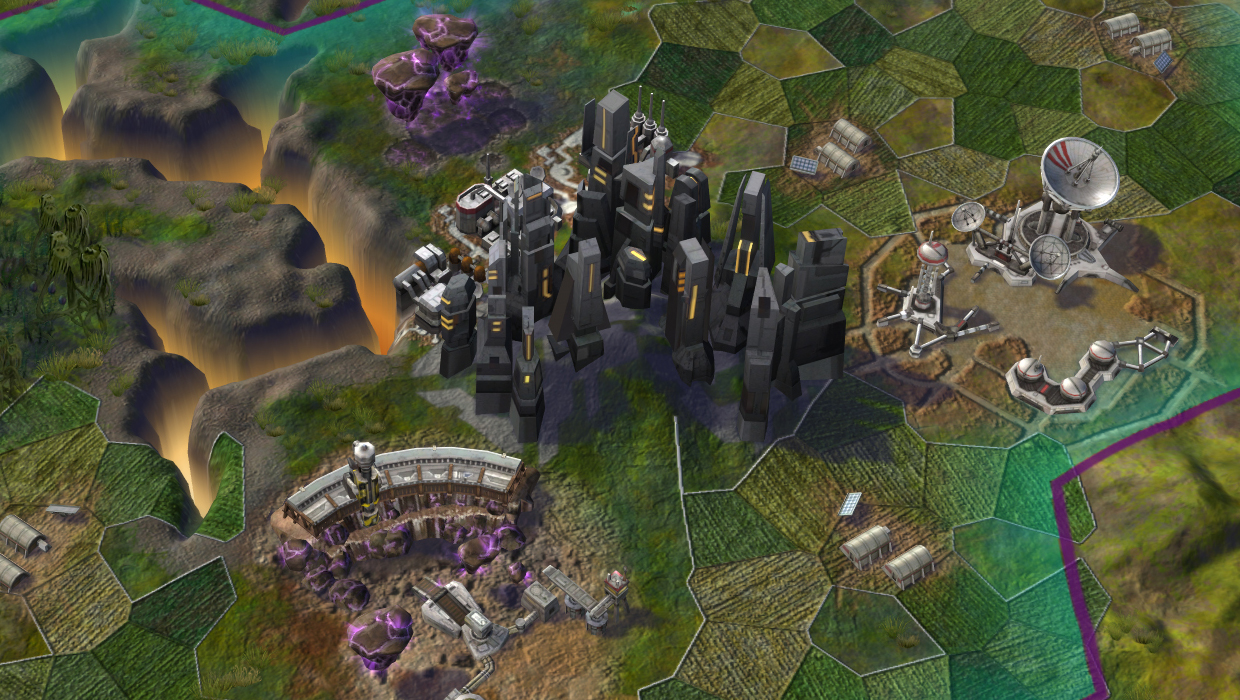
Espionage isn't entirely new to the Civilization series--but in Beyond Earth, your network of spies can play a much bigger part in your overall plan. "We wanted that to really become a secondary diplomatic channel--an under-the-table way of waging war, or filching off of other civs without actually declaring war against them," says McDonough. "If you're really good at spying, you can gain a lot more resources by stealing or smuggling."
There are no nukes in Beyond Earth--instead, you can get a spy to plant a dirty bomb in an opposing capital, which will instantly halve that city's population when detonated. And beyond just siphoning resources, your Covert Ops can lead to much more sinister tactics. "This can range from simple things like smuggling operations, which allow you to steal Energy each turn, to really complicated stuff, like planting attractors for Siege Worms," says Firaxis' Pete Murray. Few things in life are more satisfying than watching an army of giant alien worms demolish your enemy's real estate.
Your choice of Affinity can change your end goal
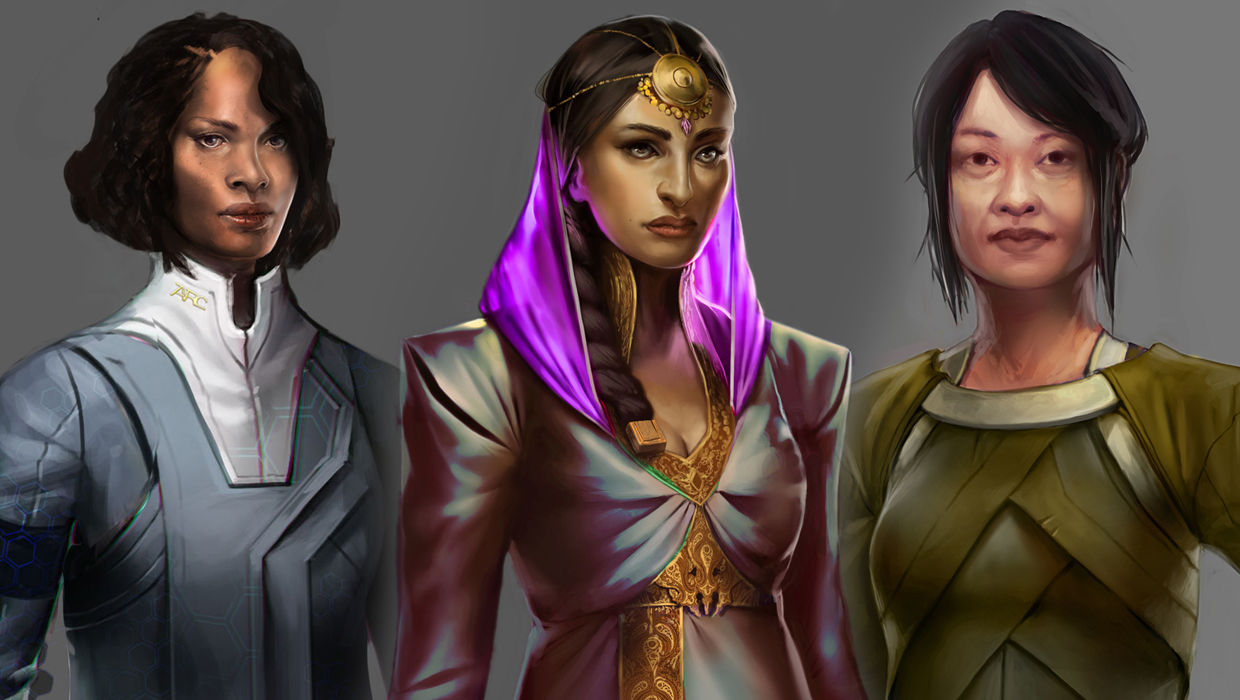
"Affinities in Beyond Earth are sort of visions for the future of mankind," says McDonough. These are civ-wide philosophies that come in three different flavors: Harmony (humans should alter their genetics to adapt to alien worlds), Purity (people have the right to reshape the world in order to make it most amenable to humanity), and Supremacy (the belief that augmentations and cybernetics are tools to overcome one's environment). Besides informing the aesthetic of a given civ's cityscape and leadership, your Affinity can also determine how you attain victory.
Two win conditions are Affinity-neutral: Domination, where you're the last civ standing, or Contact, the pacifistic win condition where you make first contact with an ancient alien race. Then there are Affinity-specific grand projects. Harmony gets Transcendence, where you awaken the planet's latent sentience ("an homage to Alpha Centauri," says McDonough). Purity has Promised Land, where you reestablish contact with Earth and fulfill your mission to find a new homeland for humanity. Supremacy gets the opposite side of that same coin in Emancipation, in which you decide that Earth's population is hopeless--so to usher them into the future, you send a sizable army back to Earth for a hostile takeover.
You can go to war in some pretty ingenious ways
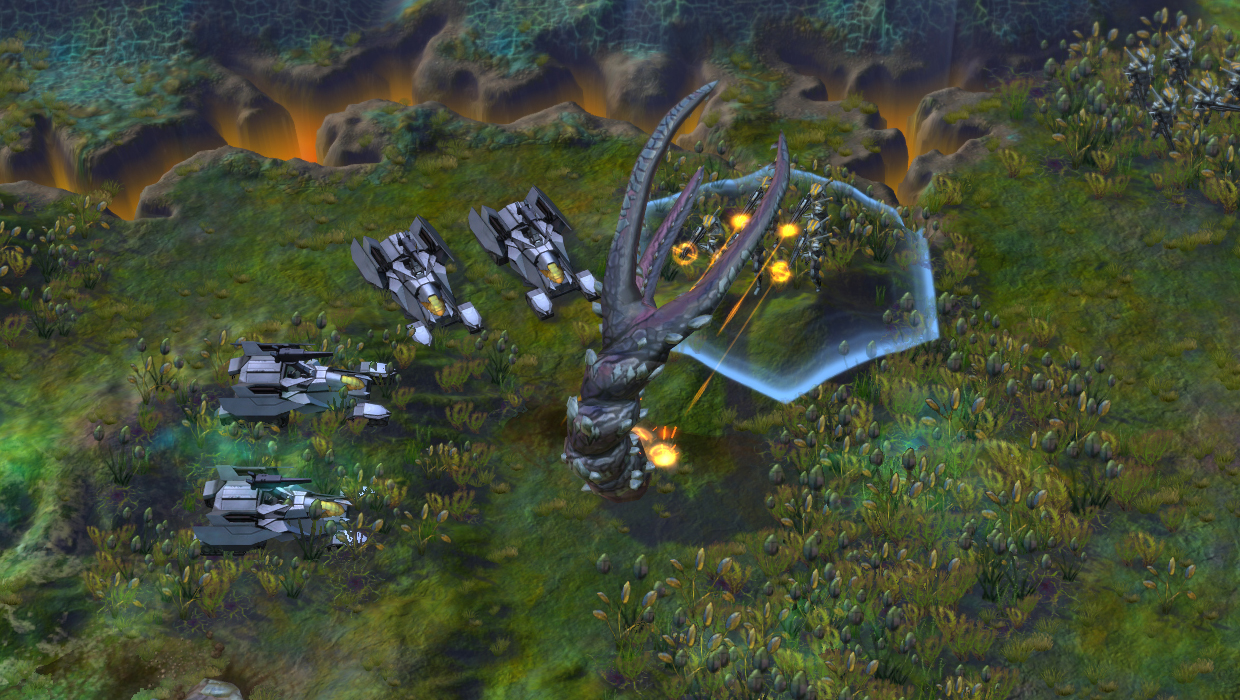
For those who prefer world domination, Beyond Earth offers plenty of creative methods for exterminating the opposition. Besides providing surveillance, your satellites in the orbital layer can wreak havoc in multiple ways. There's the direct approach with an orbital strike laser; you can also surround your enemies' civs with toxic miasma, or use your satellites to assume control over units underneath your orbital layer airspace.
You can also turn the alien population against your adversaries. In addition to the aforementioned Siege Worm attractor, you can also engineer monstrosities and sic them on another civ. "[Interaction with the aliens] goes up to and includes creating new life forms derived from their genes," says McDonough Harmony builds a mastery of [DNA] manipulation, to the point where you can just control evolution and create new life forms." One of those controllable mutations is the Xenotitan--a Godzilla-sized alien (reserved for dedicated Harmony civs) that will terrorize any player unlucky enough to incur your wrath.
Fly me to the moon

There are still plenty of unanswered questions about the next Civilization. For instance, will it have an amazing theme song like Civ 5 did? Can we subjugate aliens to do our bidding? These are the things that keep us up at night, and we'll not sleep until we find out the answers. Or... we won't sleep because we'll be playing Civ. One of those two.
And if you're looking for more, check out the most interesting things we learned at GDC and 8 short (but sweet) games.
GamesRadar+ was first founded in 1999, and since then has been dedicated to delivering video game-related news, reviews, previews, features, and more. Since late 2014, the website has been the online home of Total Film, SFX, Edge, and PLAY magazines, with comics site Newsarama joining the fold in 2020. Our aim as the global GamesRadar Staff team is to take you closer to the games, movies, TV shows, and comics that you love. We want to upgrade your downtime, and help you make the most of your time, money, and skills. We always aim to entertain, inform, and inspire through our mix of content - which includes news, reviews, features, tips, buying guides, and videos.


